Czech Samaritans
Atheists or Angels?
Article and photos by Pearl
Harris
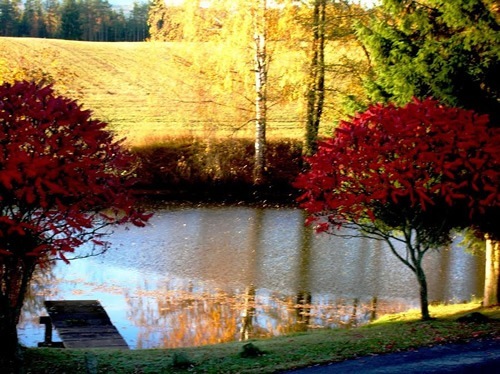
|
|
Changing seasons — the
view from my study — falling Autumn leaves,
symbolic of the transitions in my life.
|
According to statistics updated in 2013,
the Czech Republic has one of the "least religious" populations
in the world. Czechs have been labeled as "tolerant
and even indifferent towards religion." In a 2010 poll,
only 16% of Czech citizens "believe there is a God" (the
lowest rate among all the countries of the European Union).
In the 2011 census, 34.2% of the population
stated they had "no religion", 10.3% was Roman
Catholic, 0.8% Protestant, 0.5% Czech Brethren, and 0.4%
Hussite. 9.4% professed "other forms of religion," while
45.2% totally refrained from answering the question.

|
|
St. Vitus Cathedral, Prague.
|
At the time of the communist takeover
of Czechoslovakia in 1948, a large majority of the Czech
nation was Roman Catholic, with a minority being Protestants.
However, before its demise in 1989, the communist era took
its toll on religion along with all other facets of life.
Atheism being the official policy of the communists, during
the 40 years of totalitarian rule, many not-so-subtle tactics
were aimed at actively discouraging religious observance.
Church property was taken over by the State. All monasteries
and most convents were closed. Clergymen were murdered,
imprisoned, or sent to labor camps. Known adherence to a
religious sect meant limited opportunity for advancement
in the workplace. Parents had the right to religious instruction
for their primary school children, but such a request seriously
hampered a child's chances for admission to secondary school
and university.
Although religious freedom was restored
in 1989, the scars still run deep. Almost one-third of the
Czech population today claims no religious affiliation.
Although these statistics may appear shocking to most, they
are a staggering contradiction to my recent, very personal
experience of a country brimful of Good Samaritans.
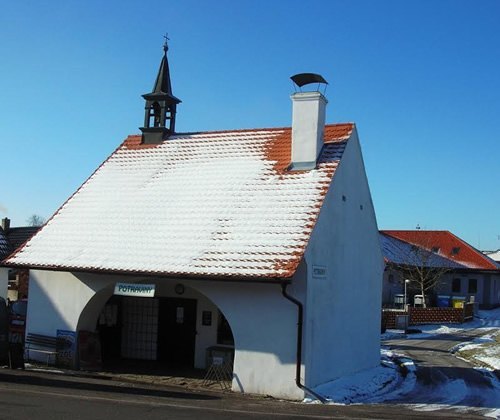
|
|
Many former village churches
today serve other purposes, such as this grocery store
in the village of Strážkovice.
|
Expat Life
Having emigrated from South Africa in
2002 with my husband, we settled happily in the South Bohemian
countryside in a tiny village near the Austrian border.
Ian and I faced the early challenging and often-difficult
years together as a team. The usual problems and reams of
red tape encountered by foreigners in a country with a language
very different from our own were overcome by always having
each other as support. With humor, tears, and gritted teeth,
we gradually began to put down our roots and to feel at
home and finally content in our new and very different environment.
Teaching
English to Czechs of all ages, desperately keen
to learn the language, made us many new contacts,
acquaintances, and gradually friends too. The Czechs
are inhibited and shy with foreigners at first, but
by showing a genuine interest in their lives, work,
and families, we came to know and appreciate their
sterling qualities. Adults old enough to have lived
through the communist era never refer to those times,
unless specifically questioned. They do not harp on
it as an excuse for any shortcomings in the country.
The attitude instead is one of looking to the future
and starting anew, and of wanting the very best for
their children. In my opinion, this is one reason
that the Czech Republic today is one of the finest
countries in the world
.
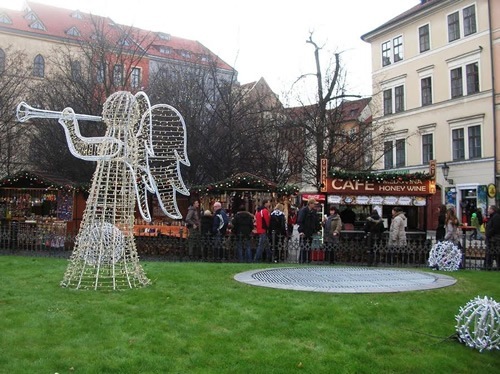
|
|
A Czech angel — Christmas lights
in Prague.
|
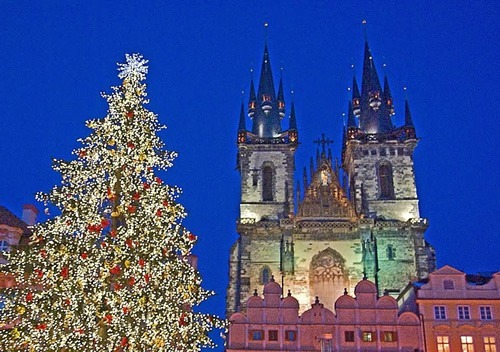
|
|
Christmas in Prague.
|
Alone as an Expat
Eleven years after first arriving in
our new home, I sadly had to say goodbye to Ian after his
long battle with Diabetes, just two days after our 28th
wedding anniversary. Anyone who is a new widow or widower
will know this feeling of desolation cannot be described
unless you have personally experienced it. After a happy
marriage, it is as if half of oneself is abruptly missing.
Together we had traveled to many countries, enjoying different
cultures and adventures and always patting ourselves on
the back for finally settling in the Czech Republic.
Despite many hurdles — in particular
bureaucratic — we managed to find a niche and were
perfectly content in our adopted country. We did not see
the lack of Czech language knowledge as a disadvantage,
as all our students were very keen to speak English. At
home, we had our library of English books, Sky News and
CNN TV — and each other — so needed nothing
more in our little world.
Suddenly, in one awful instant on a
February morning two years ago, my whole world was shattered
and I knew nothing would ever be the same again. Friends
and family wondered how I would be able to survive by myself,
left alone as a widow in a foreign country, without any
family even living on the same continent. I was often asked
the question: "So, are you going to leave now?"
At the time of Ian's death, our only
daughter was living in Canada. She was in the midst of her
university exams, which I did not wish her to interrupt.
My only sister lives in South Africa. Both my sister and
daughter wanted to fly over to me immediately on hearing
the sad news. I told them I would rather see them later
in the year, as they could not ease my pain at the time
apart from their daily Skype and email support.
Good Samaritans
This is when I, in the midst of my shock
and bereavement, began to experience at first hand the true
extent of the goodness of this "atheist" nation.
The ambulance doctor and sister who
attended to Ian when he went into a diabetic coma, did what
they could for him in our home before rushing him off to
the hospital on that dreadful morning in February. He died
on the way to the hospital. Both the doctor and nursing
sister encountered me a few days later in the main street
of the nearby market town. They had tears in their eyes
as they told me how sorry they were for my loss and that
they had done their best to save my husband. The doctor
spoke no English, so the sister spoke to me in German, which
I am much more conversant in than Czech. She, in fact, had
been the one to break the news to me on the telephone in
German that dark and cold winter's morning.
Immediately after receiving the worst
phone call one could ever receive, I had to go to the hospital
mortuary to make the funeral arrangements. There I met the
Chief Pathologist, who had been taught English by Ian when
we first arrived in the country. They had maintained their
friendship through the years. Dr. Petr Novák ushered
me into his office, offered me coffee, calmly took over
and arranged everything for me with extreme kindness and
efficiency.
I was obviously in deep shock and, sitting
in his leather armchair, could only imagine how Ian had
sat in that very chair, chatting to Petr during his private
English lessons. Petr arranged for a driver to collect me
from his office and take me to the funeral directors' office,
where a young woman, addressing me in English, most
considerately and quickly made all the funeral arrangements
for me. As no close family would be present, I opted not
to have a funeral ceremony. I was later to collect the ashes
and bury some of them in our garden in Buková, taking
the rest to our daughter in Vancouver to be scattered in
the Pacific Ocean.
The next evening, on my doorstep stood
Marie, a former English student of mine, accompanied by
Jana, our Czech neighbor who has a heart of gold, and only
speaks Czech and Russian. They came, bearing food, sympathy,
and offers of practical assistance. For the next three weeks,
every single day, Jana would bring me a piping hot homemade
meal for lunch. As she knows I am a vegetarian, this must
have caused a minor headache for her, with meatless meals
being almost unknown in this country.
A few days later, the Navrátil
family arrived — father, mother and teenage daughter — the
latter who had been my English student for many years. They
all three gave me warm hugs at the door — this meant
a great deal to me, coming from Czechs who are generally
shy and inhibited with foreigners. Ana brought me a pot
of tomato soup — guessing rightly that I had not been
eating, nor had I felt like eating anything for days. This
was in fact the first sustenance after Ian's death, which
I took, later that evening, feeling the strength and goodness
flowing into my system from her nourishing homemade broth.
She also brought me some special herbal "calming drops" which
I was told to take daily.
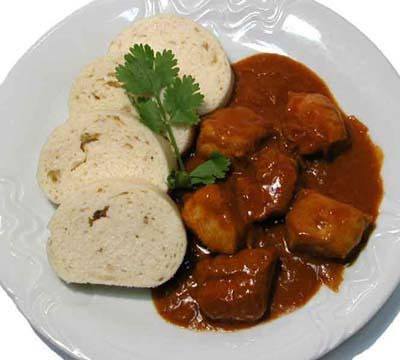
|
|
Goulash and dumplings are a typical
Czech meal. Vegetarian meals are less common.
|
While Ana and her daughter sat speaking
to me, Milan busied himself outdoors, shoveling the 60 centimeters
of snow from the driveway and footpath. This had been a
particularly severe winter and there was no way I could
have got the car out of the garage had he not performed
this thoughtful deed. I was certainly not up to shoveling
any snow myself at that stage. Milan then proceeded to give
me advice about my car insurance and other important practical
matters. Lucie, a law student, briefly explained to me the
Czech legalities regarding inheritance. They left, with
offers of further assistance and promises to visit again
soon.
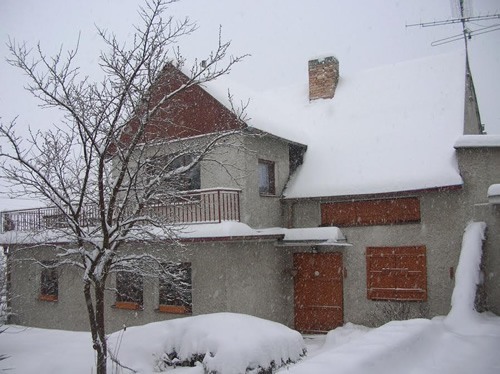
|
|
My home in the village of Buková.
|
Their regular visits thereafter were
a great comfort to me, always bearing some tasty homemade
Czech delicacy to tempt my palate. They have been a constant
source of support in the past two years, regularly inviting
me to their home for meals and always ready at the drop
of a hat to contact an electrician, handyman, or plumber
or to provide any other practical assistance when I need
it.
Friends & Neighbors
After a few weeks, when the snow had
melted, my neighbor obviously thought I needed to get out
of the house and into the sunshine. Jana asked if she could
come and "trim the shrubs" in my yard. Well, the
garden had been uncared for probably for a year or more,
while Ian had been ill. Jana tackled the džungle as
she called it, with vigor and determination. In fact, I
did not recognize the almost denuded garden when she had
finished. However, it had forced me to go outdoors to cart
away the countless wheelbarrow loads of garden refuse her
clearing campaign had generated, something I had no inclination
for, nor would ever have got around to doing, had Jana not
forced the issue.
A retaining wall in the yard had collapsed
after the heavy snowfall. Nothing daunted, there was Jana
the next day, despite suffering from a bad bout of 'flu.
She carried the heavy concrete blocks out of the way with
her bare hands and repaired the wall with earth. She next
offered to clear the rest of the large and unkempt yard,
including some trees which she regarded as being in the
way — an offer I firmly had to refuse. I actually like
my overgrown garden and "African-style" jungle
and did not fancy her removing the lot!
She reluctantly compromised by coming
regularly every week thereafter to mow the very long grass
with her electric lawnmower — a task she has continued
to this day. There is no way ever to thank her. If I give
her a gift of wine or chocolates as a token of gratitude,
she will arrive the next day bearing gifts for me in return.
Dealing with the sudden loss of a husband
is indescribably difficult. It is all the red tape that
follows that is a totally unexpected and additional nightmare.
The mountain of paperwork to be dealt with and documents
to be produced — all this is something that one in
shock cannot easily cope with alone. Dealing with bureaucracy
in one's homeland and mother tongue can be frustrating enough
for the best of us. This could therefore undoubtedly prove
to be even more of an ordeal in a foreign country and language.
Instead, it was actually made relatively easy for me, merely
through the bounty, selfless time and care of virtual strangers.
In this respect, Marie was another guardian
angel to me. According to Czech law, the "estate" has
to be dealt with by a state-appointed Notary. She knew that
I was not going to be able to cope with this alone, as the
Notary in question speaks only Czech. She therefore arranged
for her lawyer friend to be the go-between to communicate
with the Notary on my behalf. I had one friendly meeting
with the lawyer, together with an interpreter arranged for
by Marie, and that was it. The whole matter was competently
taken out of my hands. Neni problem!
After heavy rains, my gutters on the
top of the double-story house were clogged with debris — with
even long grass growing in them. My feeble attempts at clearing
them had only succeeded in breaking a roof tile! Having
related this to Marie, the next day she arrived with her
willing husband in tow, who proceeded to climb to the dizzy
height on a very long, ancient, and rickety ladder. He cleaned
all the gutters and even replaced the broken tile.
This type of compassionate and selfless
act continues daily. Benevolence, empathy, generosity, goodness — these
are scarcely adequate words to describe them. To the question: "So,
are you going to leave now?" I can only reply that
it would be very difficult to find another state which
looks after its citizens as well in the form of virtually
free, exceptional health care — or to
find another home surrounded by so many genuinely Good Samaritans.
My thoughts continually return to the
parable of the Good Samaritan. I know that, had Jesus walked
the Earth today, he would agree that people like my Czech
friends and acquaintances, despite their label of "atheists,"
are the very epitome of what he was preaching about and,
in his wisdom, trying to impart to mankind.
"You shall love your neighbor as
yourself" (Mark 12:31) and "so in everything,
do to others what you would have them do to you" (Matthew
7:12) may be unknown edicts to most Czechs, but speak
volumes about their actions.
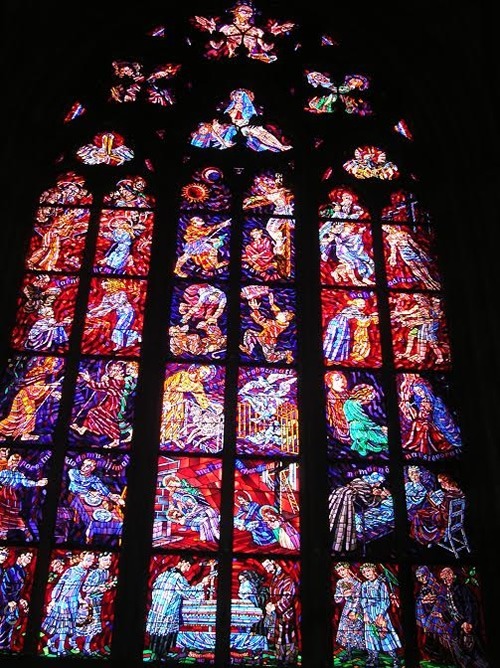
|
|
Stained glass inside St. Vitus
Cathedral, Prague.
|
The transitions I undertook to a new
country, language, culture and profession — and then
the far more difficult transition to widowhood — have
taught me some invaluable truths: If one approaches life
in a foreign country with an open mind, does not expect
anything ever to be the same as "back home," treats
locals with courtesy and respect, never looks back, but
instead only forwards to each new day as an exciting adventure
and challenge, one discovers that we are all indeed mere
citizens of the world and that kindness and compassion know
no linguistic, geographic, or cultural barriers.
For More Information
Expats.cz is
an extremely useful website for expatriates in
the Czech Republic.
Useful literature on life in
the Czech Republic, its people and customs:
The Czechs in a Nutshell — a user's manual
for foreigners, by Terje B. Englund, published
by Baset.
Xenophobe's guide to the Czechs — by
Petr Berka, published by Oval Books.
|
Pearl
Harris was born in South Africa where she spent
most of her life before emigrating to the Czech Republic
with her husband, Ian, in 2002. Besides travel, her
passions are writing, photography, reading, and animals.
She has a B.A. in English & Linguistics, post-graduate
Diploma in Translation and TEFL qualification. Formerly
an EFL teacher, Pearl now freelances and you can find more information on her website about her work proofreading & editing.
Pearl has been widely published in magazines
and on the web. Her travel memoirs, From
Africa to Buková, and the sequel Where
is my Home? are available on Amazon.com.
|
